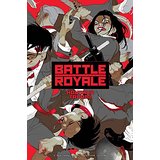On December 6, 2015, I gave my thoughts on the novel The Hunger Games. I was so impressed with the overall story that I’m rereading it to catch all the subtleties and clues to the ending that I missed the first time.
As an aspiring author, I did some research after my first read and found a controversial Japanese precursor called Battle Royale, first published in 1999. Is this where The Hunger Games idea originated? For me, that’s another topic for another time. (There is a quick discussion of this in the “Legacy” section of Battle Royale’s Wikipedia entry for anyone curious — https://en.wikipedia.org/wiki/Battle_Royale)
I was curious enough to buy Battle Royale and see for myself. I got the “remastered” edition, which is huge — 627 pages. There are superficial similarities between the two books, but I found BR is much more violent, with much more emphasis on the “game” itself and less on the long-term ramifications. The writing is in the third person with more characters (42 middle school students) with Japanese names, which made following the character threads difficult. Although there weren’t that many threads to follow — the author had the unsettling habit of introducing characters, explaining their lives and emotions, then immediately killing them off. The book did cause me to think about how people react under pressure — some resisted playing the game, others placed misguided trust in friends, some panicked, and a few became vicious killers. At one point it all became too much — I stopped reading, weary of the carnage, and only recently finished the book to see how it ended. The (somewhat contrived) ending was a surprise for me, but there was no satisfying sense of closure as in Hunger Games, which is a much more complete and layered story.
recently finished the book to see how it ended. The (somewhat contrived) ending was a surprise for me, but there was no satisfying sense of closure as in Hunger Games, which is a much more complete and layered story.
Battle Royale is another approach to storytelling that can spark thought about morality and, if the Wikipedia entry is to be believed, has had a surprisingly broad influence on popular culture. Go figure.
